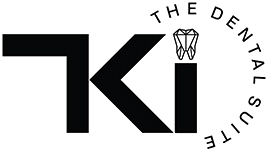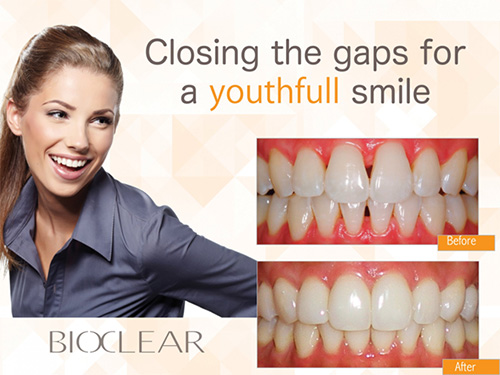



Bioclear is conservative and cost effective restorative dentistry. It is a state-of-the-art technique for treating black triangles between teeth, repairing worn or broken teeth, diastemas, and peg laterals. Bioclear utilizes a unique cutting-edge method of injection-overmolded composite to literally shrink-wrap your tooth, resulting in seamless, smooth and infinity margin restorations. It reinforces your teeth and uses minimally invasive techniques to avoid cutting down excessive tooth structure required for crowns and veneers.

A ceramic crown is a full-coverage biocompatible restoration that replicates the form and function of a natural tooth. It’s often recommended in the following the situations:

If your front teeth are stained, discolored, chipped, worn-down, misshapen, a little gapped, or slightly misaligned, you're not alone. Cosmetic imperfections may be due to genetics, excessive wear and tear on the teeth, the aging process, dietary choices that stain the dental enamel, smoking, or as a side effect of certain medications.
Porcelain veneers are thin shells of ceramic that bond directly to the front surfaces of the teeth. They are an ideal choice for improving your smile and have become increasingly popular due to their simplicity and versatility.
When bonded to the teeth, the ultra-thin porcelain veneers are virtually undetectable and highly resistant to coffee, tea, or even cigarette stains. For strength and appearance, their resemblance to healthy, white tooth enamel is unsurpassed by other restorative options.

A bridge is a restoration used to replace missing teeth and attaches artificial teeth to adjacent natural teeth, called abutment teeth. Bridges are either permanently attached (fixed bridges), or they can be removable.

The NTI (nociceptive trigeminal inhibitor) appliance is a small device that only covers your anterior teeth. It is made from acrylics and hard plastics, much like a nightguard. The large difference between the NTI and a nightguard is that the NTI device works to train your muscles to relax.

The NTI (nociceptive trigeminal inhibitor) appliance is a small device that only covers your anterior teeth. It is made from acrylics and hard plastics, much like a nightguard. The large difference between the NTI and a nightguard is that the NTI device works to train your muscles to relax.
While conventional bridgework and dental implants offer fixed solutions for rebuilding complete smiles, partial and full dentures are removable oral appliances. This means it’s possible to take dentures out of the mouth to clean and maintain the health of the underlying tissues and any remaining teeth, as well as clean the dentures themselves.
Full dentures, also known as complete dentures, can effectively replace all the upper teeth, lower teeth, or both the upper and lower teeth. As with other types of dental solutions, there’s no one-size-fits-all approach for every case. The ultimate design, fabrication, and insertion of a full denture can vary based upon a patient’s specific needs.
This type of denture is fabricated and placed after all of the remaining teeth are removed, and the surrounding tissues have adequately healed. Fabricating a full denture when healing is complete supports a precise and comfortable fit.
In situations where some sturdy teeth remain, partial dentures can offer an effective solution for the replacement of missing teeth. Partial dentures typically achieve adequate retention and stability with clasps or precision attachments on the teeth adjacent to the edentulous areas (the spaces formerly occupied by the missing teeth). They also stabilize the dentition and bite and prevent unwanted drifting of the remaining natural teeth.